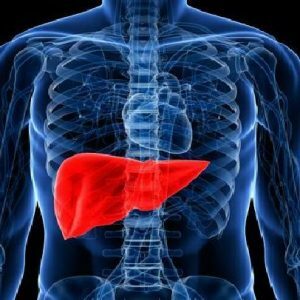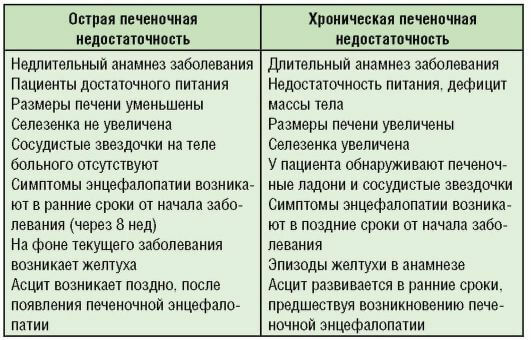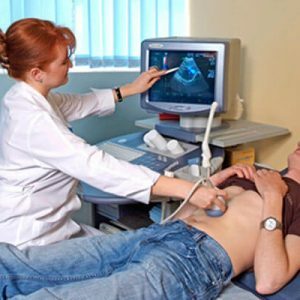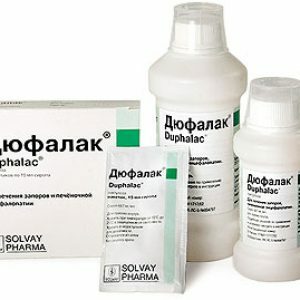Chronic liver failure: symptoms and treatment
 Hepatic insufficiency is a decrease in liver function caused by the destruction of hepatic cells( hepatocytes).In medical practice, two different concepts are distinguished: acute and chronic hepatic insufficiency.Chronic failure, in contrast to acute, develops gradually with prolonged exposure to hepatotoxic factors.
Hepatic insufficiency is a decrease in liver function caused by the destruction of hepatic cells( hepatocytes).In medical practice, two different concepts are distinguished: acute and chronic hepatic insufficiency.Chronic failure, in contrast to acute, develops gradually with prolonged exposure to hepatotoxic factors.
Causes of
Chronic liver failure progresses gradually for several months or even years.This pathological condition is characterized by a gradual unfolding of the clinical picture.
Causes of liver failure include:
- Chronic liver diseases( such as chronic active hepatitis, cirrhosis, cancer, liver helminthiasis);
- Prolonged influence of occupational hazards( work with carbon tetrachloride, benzene, phosphorus);
- Prolonged reception of hepatotoxic drugs( NVS, cytotoxic drugs, hepatotoxic antibiotics).
Hepatic tissue is highly regenerative.However, when exhausting the liver's recovery capabilities, hepatocytes die and are not restored.A critical decrease in the number of active hepatocytes actually leads to the development of chronic hepatic insufficiency, because of what the body is not able to fully work.To increase the death of hepatocytes and thereby contribute to a sharp increase in insufficiency, such factors as the use of alcohol-containing beverages, infectious diseases, intoxication, gastrointestinal bleeding.

Symptoms of chronic liver failure
Chronic liver failure is characterized by a gradual, step-by-step increase in symptoms.And no matter how long the disease did not exist at the initial stage, sooner or later it will begin to progress.
Chronic liver failure proceeds in four stages:
- The first stage is compensated;
- The second stage is decompensated;
- The third stage is terminal;The fourth stage is the hepatic coma.
Compensated stage
Symptoms that occur during the compensated stage are non-specific.The patient is concerned about loss of appetite, as well as a recurring feeling of nausea and vomiting.
The detoxification function of the liver is broken, which causes toxic substances in the body.These substances disrupt the work of the nervous system, resulting in the development of hepatic encephalopathy.At the initial stages, encephalopathy is manifested by the fact that a person quickly becomes tired, feels weak, there is a certain inhibition.The patient is tormented by constant drowsiness during the day, and at night - insomnia.For liver failure are characterized by mood swings, especially toward the depressive pole.
Decompensated stage
The pathological process in the liver progresses, which makes the existing symptoms become pronounced and permanent.Against this background, there are symptoms such as impaired coordination of motion, the appearance of a clapping tremor, problems with the memory of .A person can behave not quite adequately and even aggressively.Disorientation in space is noted.In addition, from the patient you can feel a specific sweetish liver odor from the mouth, caused by the accumulation of methionine products.
Terminal stage
At this stage of the development of liver failure, the existing symptoms are exacerbated.More pronounced signs of damage to the nervous system - there is confusion, a person does not respond to the appeal to him, but the reaction to pain affects.
Bile stasis in the liver( cholestasis) leads to jaundice and skin itching.Portable hypertension inevitably develops, manifested by an increase in the abdomen due to accumulated fluid in the abdominal cavity( ascites), an expansion of the vessels on the skin of the abdomen.The patient may notice reddening of the palms, this is the so-called palmar erythema and small vascular hemorrhages-sprouts all over the body.In addition, bleeding from the digestive tract may occur.
Coma stage
At this stage of liver failure, severe, often irreversible changes occur. The patient has a marked depression of the nervous system, which causes loss of consciousness.At the initial stage of coma, the reaction to pain is present, but soon disappears.There may be convulsions, divergent strabismus.In the stage of coma, multi-organ failure is gradually increasing.All these violations lead to irreparable consequences and death.
Diagnostics
To confirm the diagnosis of chronic liver failure, a complex of diagnostic measures is necessary. An approximate set of studies looks like this:
-
 Clinical blood test - an increase in the number of white blood cells, as well as a decrease in the number of erythrocytes, platelets and a decrease in hemoglobin level;
Clinical blood test - an increase in the number of white blood cells, as well as a decrease in the number of erythrocytes, platelets and a decrease in hemoglobin level; - Biochemical blood test - pay attention to the levels of bilirubin, ALaT and ASAT, alkaline phosphatase, creatinine;
- Coagulogram - reduction of prothrombin index of blood;
- Ultrasound of the abdominal cavity organs - allows a doctor to assess the liver parenchyma, liver size.
Principles of treatment of chronic liver failure
When the liver function is turned off, toxic substances that have a truly toxic effect accumulate in the body.To combat this phenomenon, detoxifying agents( Rheosorbilact, Neogemodez) are prescribed.In addition, the patient is shown the use of Lactulose( Dufalac).This medicine, which binds ammonia, accumulating in liver failure.As the intestinal bacteria produce ammonia, antibacterial drugs are additionally prescribed for their suppression( Neomycin).If the detoxification therapy is ineffective, the patient is given plasmapheresis, when blood plasma is passed through special filters to purify it of toxins.
 Symptomatic treatment plays an important role.So, to remove stagnant fluid from the body, antidiuretic drugs are prescribed( Furosemide, Mannitol).To stop bleeding appoint Vikasol or Aminocaproic acid, and with large blood loss - transfusion of blood components.To correct the work of the brain, the patient is shown to use drugs that improve his blood supply( Cerebrolysin, Actovegin), sedatives.To prevent the influence of adverse factors on hepatocytes, the patient is prescribed hepatoprotectors( Essentiale, Hepabene), vitamin preparations.
Symptomatic treatment plays an important role.So, to remove stagnant fluid from the body, antidiuretic drugs are prescribed( Furosemide, Mannitol).To stop bleeding appoint Vikasol or Aminocaproic acid, and with large blood loss - transfusion of blood components.To correct the work of the brain, the patient is shown to use drugs that improve his blood supply( Cerebrolysin, Actovegin), sedatives.To prevent the influence of adverse factors on hepatocytes, the patient is prescribed hepatoprotectors( Essentiale, Hepabene), vitamin preparations.
In case of liver failure, the patient should adhere to a special diet.To reduce the ammonia in the blood, you need to limit the consumption of protein products to 40-60 grams.Also, doctors recommend reducing the amount of salt in food to prevent the development of ascites.
Grigorova Valeria, medical reviewer



